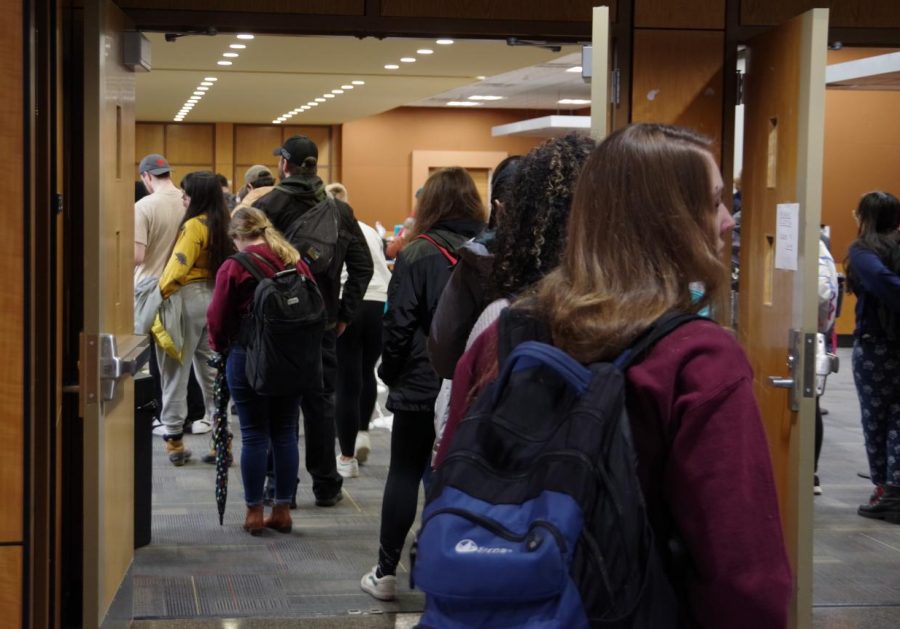Board of Elections to implement safety measures at voting sites
The line for provisional ballot voting stretches past the door. Gary Moorman estimates at least a 30 minute wait for provisional ballot voting.
Thousands of people voted at polling sites across Watauga County during the March primaries. Sometimes, the lines would be hundreds more than 50 people long, crowding hallways and precincts.
The coronavirus pandemic hasn’t slowed down, so polling sites across the county are enacting safety measures to protect voters and poll workers.
For Watauga County Director of Elections Matt Snyder, safety is key for planning for the upcoming election.
“A lot of thinking has gone into this year in the election of how to protect our voters and how to protect our election officials,” Snyder said. “We’ve got a really good game plan to do the best we can to mitigate the chances of spread.”
He said polling sites will hand out individual pens, gloves and masks to voters if they want them.
“If you don’t have a mask and you want to come vote but you’re afraid, we have masks that we are prepared to hand out,” Snyder said.
Sites will also have hand sanitizer stations available when a voter exits and enters a polling station.
Carson Jennings, a senior political science major, said he plans to vote in person.
“With myself being younger, healthy, I don’t have any particular health concerns, I don’t have an issue going to an in-person voting site,” Jennings said.
In Watauga County, 44,765 people are registered to vote.
Jennings said he feels voting in a more densely populated area is riskier because more people will go to the polls and social distancing and cleaning are harder.
“I hope that the BOE can maintain and keep a safe place for voters to go vote in person,” said Dalton George, president of the App State College Democrats. “Making sure voting is accessible and safe should be a priority and the plans in place are a step in the right direction.”
River Collins, president of App State College Republicans, said he thinks in-person voting is essential.
“In person voting has always been an option during elections and many could find it difficult or uncomfortable to transition to other forms,” Collins said. “Voting in person should be a pleasant experience for all, including those weary of the coronavirus.”
For the elderly population at higher risk, Snyder said requesting an absentee ballot would be the safest way to vote with the pandemic.
The last day to request an absentee ballot is Oct. 27, but election officials are urging voters to send absentee ballots in as soon as possible.
Just over 16% of Watauga County’s population is 65 or older.
If a voter is elderly or disabled and does not want to vote by mail, they can utilize curbside voting.
“They can simply vote from their car,” Snyder said. “We will have curbside stations with bells and people will come out and you’ll be handled just like every other voter.”
According to the North Carolina State Board of Elections, before a ballot is issued to a curbside voter, that voter must swear an oath affirming their qualification to use curbside voting.
Those qualifications include age, physical disability or physical barriers preventing their entrance to a voting site.
“We take the responsibility of protecting our friends and neighbors very seriously,” Snyder said. “We don’t want anything else going on to make you feel like you have an obstacle to voting.”
Snyder said if a voter has specific concerns they can call the BOE at 828-265-8061 to address them.
One-stop early voting will take place Oct. 15 to Oct. 31 and polls will be open from 6:30 a.m. to 7:30 p.m. on Election Day.
We hope you appreciate this article! Before you move on, our student staff wanted to ask if you would consider supporting The Appalachian's award-winning journalism.
We receive funding from the university, which helps us to compensate our students for the work they do for The Appalachian. However, the bulk of our operational expenses — from printing and website hosting to training and entering our work into competitions — is dependent upon advertising revenue and donations. We cannot exist without the financial and educational support of our fellow departments on campus, our local and regional businesses, and donations of money and time from alumni, parents, subscribers and friends.
Our journalism is produced to serve the public interest, both on campus and within the community. From anywhere in the world, readers can access our paywall-free journalism, through our website, through our email newsletter, and through our social media channels. Our supporters help to keep us editorially independent, user-friendly, and accessible to everyone.
If you can, please consider supporting us with a financial gift from $10. We appreciate your consideration and support of student journalism at Appalachian State University. If you prefer to make a tax-deductible donation, or if you would prefer to make a recurring monthly gift, please give to The Appalachian Student News Fund through the university here: https://www.givecampus.com/campaigns/54088/donations/new?designation_id=faa93386&

Moss Brennan (he/him) is a senior journalism major with a minor in political science and media studies. He has worked on The Appalachian since freshman...

